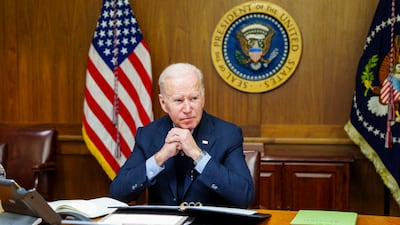US President Joe Biden told Russian President Vladimir Putin that any move to invade Ukraine would be met with a strong response that would "impose swift and severe costs".
They spoke in an hour-long phone call on Saturday in an attempt to defuse tensions over a Russian military build-up along the Ukraine border.
Mr Biden told Mr Putin that the US would continue diplomacy but it was "equally prepared for other scenarios", according to the White House.
He also said a war would result in "widespread human suffering" which would reduce Moscow's global standing.
“President Biden was clear with President Putin that while the United States remains prepared to engage in diplomacy, in full coordination with our Allies and partners, we are equally prepared for other scenarios,” the White House statement said.
The call was “professional and substantive” but produced “no fundamental change in the dynamic that has been unfolding now for several weeks,” according to a Washington official.
Yuri Ushakov, Mr Putin’s top foreign policy aide, said that while tensions have been escalating for months, in recent days “the situation has simply been brought to the point of absurdity.”
"Hysteria has reached its peak", he said, but added that "the presidents have agreed to continue contacts at all levels".
He said Mr Biden mentioned the possible sanctions that could be imposed on Russia, but “this issue was not the focus during a fairly long conversation with the Russian leader”.
Before talking to Mr Biden, the Russian president had a telephone call with French President Emmanuel Macron. The duo met earlier in the week in Moscow to try to resolve the crisis. A Kremlin summary of the call suggested that little progress was made towards cooling down the tensions.
The call took place after US Secretary of State Antony Blinken spoke to Russian Foreign Minister Sergey Lavrov on Saturday to discuss the crisis, after the US administration said an attack was a “very distinct possibility".
During that call, Mr Blinken said the West remained open to dialogue with Russia and urged the Kremlin to choose diplomatic rather than military means to resolve the stand-off.
Mr Blinken “made clear that a diplomatic path to resolving the crisis remained open, but it would require Moscow to de-escalate and engage in good-faith discussions”, State Department spokesman Ned Price said.
“He reiterated that should Moscow pursue the path of aggression and further invade Ukraine, it would result in a resolute, massive, and united transatlantic response.”
Mr Lavrov said he told Mr Blinken that “the propaganda campaign launched by the United States and its allies about Russian aggression against Ukraine pursues provocative goals”.
On Friday, the UK and the US urged their citizens to leave Ukraine as soon as possible.

Several Nato allies, including Canada, Norway, Germany, the Netherlands and Denmark, are asking their citizens to leave Ukraine, as has non-Nato allies New Zealand and Australia.
Despite massing more than 100,000 troops and military equipment at its border with Ukraine, Russia has repeatedly denied any plans to invade its neighbour.
On Friday, National Security Adviser Jake Sullivan told Americans in Ukraine that they should not expect the US military to rescue them in the event that air and rail transport links are severed after a Russian invasion.
Mr Sullivan said Russian military action could start with missile and air attacks, followed by ground troops.
He said the scale of such an invasion could range from a limited incursion to a strike on Kiev, the capital.
Mr Sullivan’s statement narrowed the projected time frame for a potential invasion, which many analysts had believed was unlikely until after the Winter Olympics in China end on February 20.
He said the combination of a further Russian troop build-up on Ukraine’s borders and unspecified intelligence indicators prompted the administration to say that war could begin at any time.
“We can’t pinpoint the day at this point, and we can’t pinpoint the hour, but that is a very, very distinct possibility,” Mr Sullivan said.
Russia scoffed at the US talk of urgency.
“The hysteria of the White House is more indicative than ever,” said Maria Zakharova, a Russian Foreign Ministry spokeswoman.
“The Anglo-Saxons need a war. At any cost. Provocations, misinformation and threats are a favourite method of solving their own problems.”
Ukraine's President Volodymyr Zelenskiy on Saturday said information and warnings from the West were “causing panic”.
He demanded to see evidence of a Russian invasion planned for as early as Wednesday.
The plan, reported by German daily newspaper Der Spiegel, is said to include routes that might be used by Russian forces.
The US Secret Service, the CIA and the Pentagon analysed the information before it was shown to Mr Biden.
Speaking during a live broadcast on Saturday, Mr Zelenskiy directly addressed the Biden administration, urging it to show it the intelligence it had received.

“If you have 100 per cent certain information about a Russian invasion of Ukraine, please share it with us.”
He said he had a lot of information which needed to be analysed before he relayed it to the Ukrainian public.
“I have to analyse all the information which we have. We have a lot of information because we are on these borders, it’s our borders, it’s our territory,” he said.
“I have to speak with our people… and [tell] people the truth and the truth [is] that we have different information and now the best friend for [Russia] is panic in our country. All this information helps only for panic; it doesn’t help us."
Ukrainians took to the streets of Kiev on Saturday to protest against Russian aggression, with crowds marching through the streets carrying a banner reading "Ukrainians will resist".


